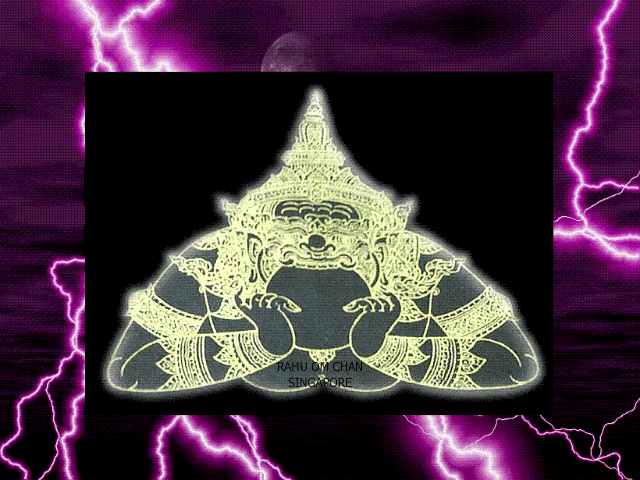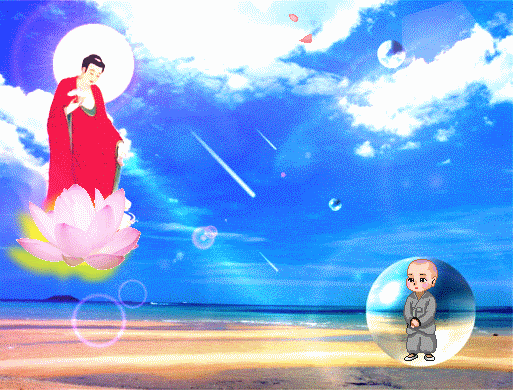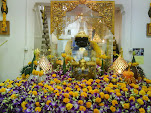Thursday, 29 May 2008
Glass coffin with body of revered Buddhist monk stolen from Myanmar monastery
A group of armed men on Wednesday stole the body of one of Myanmar's most revered Buddhist monks, whose corpse has been preserved in a glass coffin since he died more than four years ago. Officials said the coffin containing the body of Sayadaw Bhaddanta Vinaya, better known as Thamanya Sayadaw, was stolen from the monastery in eastern Myanmar where he had preached.
The officials, who insisted on anonymity because they were not authorized to release information, said at least nine armed men wearing camouflage clothing carried out the theft. They said they had no idea who they were or why they took the body.
Thamanya Sayadaw ― the abbot of Thamanya mountain ― was a highly revered monk who attracted thousands of followers to his temple daily before he died in November 2003 at the age of 93.
Among those who journeyed to pay homage to him at his mountain retreat 160 kilometers (100 miles) east of Yangon was pro-democracy leader Aung San Suu Kyi. She, like most people in Myanmar, is Buddhist.
Emerald Buddha - Wat Phra Keow, Chiang Rai
Although no one can confirm the date of its construction, it is believed that the temple has existed ever since the city was founded. It was initially known as "Wat Pa Yia" which means the yellow bamboo forest in Thai as there was a lot of bamboo growing in this area.
The Emerald Buddha is believed to have been hidden in the chedi of Wat Pa Yia by King Mahabhrom in 1392 A.D. Legend tells that In the year 1434 A.D.the Emerald Buddha was discovered by chance when lightning struck the chedi. After this, the name of the temple was changed to Wat Phra Kaew. The Emerald Buddha remained in Chiang Rai for 45 years before being taken to Chiang Mai. However, the elephant carrying it refused to go all the way and the image was housed in a temple in Lampang for 32 years. Then in 1468, it finally moved to Chiang Mai where it stayed for 85 years at Wat Chedi Luang. In 1553, it was captured and taken to Laos where it stayed for 225 years. The Thais, under King Taksin, retrieved the sacred image and took it to Thonburi and then finally to its present location in Bangkok in 1778. A replica of the Emerald Buddha was created and can be seen in it's original home in the Chiang Rai Wat Phra Kaeo.
The temple contains many interesting design and style features and is definitely worth a visit.
Note: Thank you Mr SCY for contributing the photos.
Tuesday, 27 May 2008
Mummified monk at Wat Khunaram
The body of Samui's most famous mummified monk, Loung Por daeng, is on display here in a specially constructed building. When he died more than 20 years ago, he was sitting in a meditation position. He is still in that same position and his body shows few signs of any major decay. Wat Khunaram is on the 4169 ring-road between the Na Muang waterfalls and Hua Thanon.
Phra Khru Samathakittikhun (Dang Piyasilo) or Loung Por Daeng, was born in 1894, was a well respected family man within the local community on Koh Samui and first become ordained as a monk when he was in his early twenties. He spent two years in Wat Samret before exiting and marrying a local lady from Lamai with whom he had six children, a few still alive on the island today.
Upon reaching fifty years of age, once his children were all grown up, Loung Por Daeng, decided to dedicate the latter part of his life to Buddhism and returned to the temples where he felt so at peace. He was ordained as a monk in 1944.
He then travelled to Bangkok where he spent some time studying and learning more about Buddhist texts and meditation, one of the great passions of his life.
It is believed that upon returning to Koh Samui he went to meditate in a cave, Tham Yai in Lamai, which is located within present day Tamarind Springs.
Later he moved to Chaweng and was one of the first monks to stay in the location that nowadays is known as Wat Pang Bua. He was one of the first Jao Wat's, which is the Thai term for Abbot, who led the temple into its present existence.
Following this, he decided to return to his family home, which was located just behind the current Wat Kunaram where the temple school is located. Most famously, two months before his death, at the age of 79 years and 8 months, he requested the company of his students to inform them that he felt his death was imminent and wanted to instruct them as to his last wishes. He requested that should his body decompose that he be cremated and his ashes scattered at the famous 'Saam Jaeg' in Hua Thanon, meaning the three forked road intersection, in Thai.
He went on to request that should his body not decompose, he would like to stay at the temple and be placed in an upright coffin on display as a symbol to inspire future generations to follow Buddhist teachings and be saved from suffering.
In his final seven days of mortal life, he no longer spoke to anyone or ate or drank anything, concentrating solely on his mediation and the path to enlightenment. He died a week later in the same position that we can see him sitting in nowadays.
He's in impeccable condition considering he died 30 years ago and on his head one can still see some hairs.
When his eyes fell into his head, the monks at the temple fitted him with some sunglasses.
He is still sitting in the original position of his meditation.
Luang Phoo Budda Thawaro
Monk Luang Phoo Budda Thawaro, hundred and one years old, has been dead for more than thirteen years stands before his congregation.
Monday, 26 May 2008
Blogging will be temporary impossible!
I can't blog in the office and now I can't do it at home! Arrggg.. It's so frustrating! I have some article on hand, but since I'm outside now, I can't post all up.. It's really really frustrating!
Well, I almost throw the PC down from 18 floor yesterday, I guess i'll just let it rot till some kind soul come and visit my PC, as for when?? I DON'T KNOW! What to do, It's not the latest model nor the best PC so I can't expect much from it! Guess "she is just too tired and needs a rest. Meanwhile Let see what will happen, I'll find my ways to put up the article somehow!
Tmrw will be better! :)
Dead Monk Walking
He has been dead for 13 years.
Wat Krang Chu Si Charoensuk is located near Singburi, a provincial town in central Thailand, a couple of hours north of Bangkok. Born in 1894 in Lopburi and ordained in 1922, the revered monk acted as abbot for several monasteries, surviving wars, civil conflict, dictatorships and military coups. His charisma brought people to the temple. Under the guidance of Luang Phoo, life at Wat Krang Chu Si Charoensuk blossomed.
Nowadays, Luang Phoo rests in a glass coffin within the wat's prayer hall. On his birthday, he is lifted from his slumber, cleansed and paraded in front of the ever-shrinking congregation.
Once Luang Phoo has been extracted from the glass coffin Everyone pushes to the front to pay their respects. Camera flashes illuminate the scene while the monks undress the dead abbot and put a new orange robe on him. A woolly hat is pulled over Luang Phoo's bald skull. A second hat is pushed on top. Even his socks are changed. Finally, the crowd pushes in, tiny flakes of gold in their hands
Finally, the other monks pick up Luang Phoo as gingerly as possible and maneuver him back towards his coffin. Eventually, the monks manage to return the corpse to its repository with sufficient dignity.
Incredibly, the abbot does not decompose. His body has mummified, allegedly because Luang Phoo dehydrated himself on his deathbed. It is believed that a monk who does not decompose following his death should be preserved and worshipped. Often, local authorities disagree and there have been conflicts over whether to burn some monks' remains or keep them in a glass coffin, as at Krang Chu Si Charoensuk.
Friday, 23 May 2008
Buddhist monks produces free wheelchairs
Over the past ten years, he has led a group of villagers in producing wheelchairs, efforts which have helped a total of 4,000 disabled people to carry out their errands and daily life.“Some disabled people cannot run an errand. Therefore, we want to help them. A finished wheelchair is delivered to the provincial administration, which can give it away at its own choice. But my wheelchairs cannot be sold.”, said Phra Khru Boonchuay.
Phra Khru used cash donations from his temple to buy wheelchair frames and major parts.Before entering the monkhood, Phra Khru Boonchuay was a mechanic. That’s how he’s able to produce a wheelchair which costs about 3,000 Baht, while a typical one is sold at around 10,000 Baht. His team can produce a total of around 300 – 400 wheelchairs per month.
Despite his goodwill, some cynics said the abbot initiated the project in the hope of gaining publicity. The abbot said the criticism was only natural."At first, the criticism was rather strong. But it has been less severe. Criticism is an unavoidable component of our life. What we should do is to keep doing good deeds in order to pay for our sins in a past life.", said Phra Khru Boonchuay Despite being a Buddhist monk, Phra Khru Boonchuay took several years to prove his good intentions.
He has promised to carry on the charity project for many years to come.
Thursday, 22 May 2008
Thai superstitions and Old Wives Tales
(2) Do not touch a buffalo horn because it won't grow any more
(3) Do not turn over a puppy because it will go and eat your chicken
(4) Do not touch a horse's tail because it will get sick
(5) Do not hit a dog with a bamboo pole meant for carrying things because it will become rabid
(6) Do not hit a cat because it is as much sinful as hitting a novice monk
(7) Do not hit a cat on the head because when you grow old your head will shake like the cat did when you hit it
(8) Do not rest a cow or a buffalo in the temple grounds because it is a sin
(9) Do not let a black cat jump across a corpse because the dead spirit will then become an angry ghost
(10) Do not raise five cats and six dogs because it will be bad luck for you
(11) Do not chain a monkey because your children will have small wrists like it has been chained(12) Do not pat a cat’s back because you will make it thin
(13) Do not catch a firefly because your plates and bowls will break often
(14) Do not allow a husband and wife to go and see a snake together because the wife will have a miscarriage
Credits: Richard Barrow
Wednesday, 21 May 2008
Old Buddha statue stolen, pets killed
Abbot Phra Kru Santisunthorn said the thieves broke the lock on the entrance door of the ubosot, or ordination hall. The dead temple pets were found inside.
A gold-plated statue of Buddha subduing Mara was missing from its pedestal. The four centuries-old statue was invaluable, dating back to the early Ayutthaya period, he said.
The abbot believed the thieves gave the animals food laced with poison to make it easier for them to steal the statue, which was heavy. He said they would have needed a vehicle to take it away. A donated sound system kept in a nearby pavilion was also stolen.
Police believed the thieves may have been paid to steal the statue.
Bangkok Post 20.05.2008
Karma - Thai Point of Views
* If you build or maintain public roads in this lifetime, you will have your own car in the next.
* If you donate robes to a monk in this lifetime, you will have fashionable clothes in the next.
* If you donate food to the poor in this lifetime, you will have plenty of food in the next.
* If you are stingy with your money in this lifetime, you will be poor in the next.
* If you donate money to the temple in this lifetime, you will have a large house in the next
* If you put flowers on the shrine in this lifetime, you will be beautiful or handsome in the next.
* If you pray often in this lifetime, you will be clever in the next.
* If you release birds or fish
* you will enjoy a long life in the next.
* If you kill people in this lifetime, you will die young in the next.
* If you abuse your husband in this lifetime, you will be a spinster in the next.
* If you have affairs with married women in this lifetime, you will never find a wife in the next
* If you donate oil for lamps at the temple in this lifetime, you will have bright eyes in the next
* If you are rude to your parents in this lifetime, you will be deaf and dumb in the next
* If you didn't pay your debts in this lifetime, you will be born as a cow in the next.
* If you donate medicine for sick people in this lifetime, you will be healthy in the next
* If you are cruel and cold-hearted in this lifetime, you will be all alone in the next.
* If you like to look at nude pictures in this lifetime, you will be blind in the next.
* If you gossip about people in this lifetime, you will have a harelip in the next.
* If you like cheating people in this lifetime, you will be born as an animal in the next.
* If you don't help people in danger in this lifetime, you will be in prison in the next.
* If you sneer at beggars in this lifetime, you will starve to death in the next.
* If you look down on servants in this lifetime, you will be ugly in the next.
* If you don't believe in the Buddhist teaching in this lifetime, then you will be deaf in the next.
* If you hurt animals in this lifetime, you will have leprosy in the next.
* If you are envious of other people in this lifetime, you will have body odour in the next
* If you make a false charge against a monk in this lifetime, you will be struck by lightning in the next.
Although there is nothing you can do about it for this lifetime, you can take steps to give yourself a better time in the next life or the one after that.
Karma - Thai Point of Views
* If you build or maintain public roads in this lifetime, you will have your own car in the next.
* If you donate robes to a monk in this lifetime, you will have fashionable clothes in the next.
* If you donate food to the poor in this lifetime, you will have plenty of food in the next.
* If you are stingy with your money in this lifetime, you will be poor in the next.
* If you donate money to the temple in this lifetime, you will have a large house in the next
* If you put flowers on the shrine in this lifetime, you will be beautiful or handsome in the next.
* If you pray often in this lifetime, you will be clever in the next.
* If you release birds or fish
* you will enjoy a long life in the next.
* If you kill people in this lifetime, you will die young in the next.
* If you abuse your husband in this lifetime, you will be a spinster in the next.
* If you have affairs with married women in this lifetime, you will never find a wife in the next
* If you donate oil for lamps at the temple in this lifetime, you will have bright eyes in the next
* If you are rude to your parents in this lifetime, you will be deaf and dumb in the next
* If you didn't pay your debts in this lifetime, you will be born as a cow in the next.
* If you donate medicine for sick people in this lifetime, you will be healthy in the next
* If you are cruel and cold-hearted in this lifetime, you will be all alone in the next.
* If you like to look at nude pictures in this lifetime, you will be blind in the next.
* If you gossip about people in this lifetime, you will have a harelip in the next.
* If you like cheating people in this lifetime, you will be born as an animal in the next.
* If you don't help people in danger in this lifetime, you will be in prison in the next.
* If you sneer at beggars in this lifetime, you will starve to death in the next.
* If you look down on servants in this lifetime, you will be ugly in the next.
* If you don't believe in the Buddhist teaching in this lifetime, then you will be deaf in the next.
* If you hurt animals in this lifetime, you will have leprosy in the next.
* If you are envious of other people in this lifetime, you will have body odour in the next
* If you make a false charge against a monk in this lifetime, you will be struck by lightning in the next.
Although there is nothing you can do about it for this lifetime, you can take steps to give yourself a better time in the next life or the one after that.
Tuesday, 20 May 2008
Rahu the Dragon's Head-Astrology
They have no sign ruler ships, although they are said to favor Mercury and Jupiter's signs according to some authorities, while others claim that Rahu favors the sign of Aquarius and Ketu the sign of Scorpio.
Rahu, the North Node of the Moon means to conceal, engulf or hide in Sanskrit. This Graha is associated with the world of material manifestation and worldly desire. Rahu is associated with the spiritual process of involution, or the engrossing of spirit in materialization. Rahu is a karaka, or indicator, of worldly desire, fame, greed, high intelligence, manipulation, obsessive behavior, foreigners, mass disease, dementia and inertia. The nature of this Graha is Vata, or Airy.
The gemstone associated with Rahu is a honey colored hessonite. Rahu reaches full maturity at age 42. The Puranas describe Rahu as half-bodied, born of a lioness, snakelike, having a huge body and being extraordinarily powerful.The Skanda Purana says that Rahu is instrumental in strengthening ones power and converting even an enemy into a friend. The effect of snakebite is removed by his grace. The lunar and solar eclipses are attributed to Rahu and Ketu. Rahu and Ketu stay 1 1/2 years in each Graha.
The orphan monks of Myanmar
Monday, 19 May 2008
LP Noi~~Wat Srisathong
Sunday, 18 May 2008
Wisakha Puja
Happy Vesak Day
Happy Vesak Day !
May you be enlightened by Lord's preachings... And may HIS Perpetual Light shine upon you.
Wishing that Peace and Tranquility be by your side.. Today and Always!
Saturday, 17 May 2008
天狗抱月之神
啦天神佛像外型全身黑色,戴,豹眼獠牙,身高大,口中咬著太阳或月亮,神情十分凶恶,使人望而生畏。
一般人也会奇怪,为何神像只有上半身根据泰國民间记载並转帖如下 :
约于一万年前,啦壶的父亲「他屈神连」,是掌管地狱众生的夜叉王。啦壶少年时很顽皮,性格好动。他不但武藝高強,还会凌空飞行,时常飞上天宮玩耍。有一天,天宮举行大法会,由天帝「拍意實運」主持,保护神「拍啦啦」担当总护法,日神與月神及众天神担任守衛。這次大法会是集合众天神的法力,制造威力強大的甘露圣水。
制造甘露圣水大功告成,众神正在庆祝。啦壶喜愛热闹,好奇地潛入法会观看,卻被日神和月神发觉,將他驱逐出外,态度十分橫蠻。啦壶不甘受辱,便与日月兩神打斗起來。他有飞行之术,跃高竄低,非常迅速,转眼间已失去了踪迹。
啦壺乱打乱撞的闯进一个密室,飞翔了一会,感到口甘舌燥,拿起供案上的水壶,便喝得一滴不剩。水壺中的竟然是众天神合力製成的圣水。啦壶喝后,功力大增,日月兩神赶到時,已不是他的对手。
日月兩神发觉啦壺偷喝了圣水,连忙禀报天帝。天帝大怒,召集众天神围攻啦壶。惟是啦壶喝了圣水之后,武功突然增強,众神亦奈何他不得。后來总护法拍啦啦祭起了无圣堅不摧的锯齿金轮,把啦壶橫腰斩断。
啦壶喝了圣水,身体虽被斩断,仍能生存不死,飞返家中。夜叉王得知情由,亲自绑起爱子帶到天宮向天帝请罪。天帝看见啦壺的下身已被斩去,仍能不死,又爱他武藝高強,便赦免了他的罪行,还把他封为护法,以此改邪归正。
由于啦壶当日闯入天宮時被日月兩神驱赶,害得他被斩断身体,所以他对日月兩神,仍是怀恨于心,发誓要將天地间所有小人,告密者一一消滅及和吞噬。佛像口咬太阳或月亮,也是这个缘故。泰国人还把日食和月食,当作是啦壶天神对日月兩神的惩罚。每逢日食或月食,泰国人认为这是向啦壶天神请求庇佑和许愿的最好时机。
Spreading 2,500-year-old teachings
"A lotus grows out of mud, yet it remains unaffected, unstained by the dirty, stagnant water. You are lay people; you live in the world and yet you can lead a spiritual life. It is spiritual values that bring real beauty, colour and fragrance to human life. Without spiritual values, human life is like a flower tree without flowers!"
So preached Gautam Buddha more than 2,500 years ago.
What is Buddha Jayanti?Buddha Jayanti or Buddha Purnima is the most sacred festival of Buddhists. It is the birth anniversary of Lord Buddha and falls on the full moon of the fourth lunar month (month of Vaisakh).The day commemorates three important events of Buddha's life, his birth, his enlightenment and his attainment of Nirvana.
Never Judge a book by it's cover.
Always, there will be someone, whom i should say, just simply did not think before they say something which will hurt others. I sent out a few smses to my friends and relatives, they are people who always help when some disaster happened and a donation is needed. To my surprise, one of them, I wonder what went wrong, reply me - DON'T WANT! yes, in cap and just these 2 words.
Okay, i was shocked, but at the same time telling myself, it's alright, all these donation are voluntarily, i can't force people to do so, but i was really taken back by the reply, but that won't stop me from doing all these, of course I hope no more disaster would happen and I don't have to do so.
This is not the only time, someone once told me they would like to contribute to the old and needy, they proposed to buy food and groceries for them, so I have to do some homework such as list of old folks home, what they need and etc.. after consolidating the info I presented to them and guess what ? First man said " Aiya, i think we should help the orphan instead"! Then the next one said " aiyo, they are so old, and it's their karma to be ended up in the HOME, don't need lah"!
I was angry, very angry with those irresponsible comment from him, very sad that all my effort and hard work gone! I'm just stupid, and not once but cheated twice by the same group of people. That's why I have 2 sets of info at home, but I didn't give up, I can't help much, but i have my siblings and good friend who is willing to help me to help the needy, we visit them like every 6 month and we donate food and medicine to different homes very 6 month, I'm sure i'll be able to complete my list some years, at least i make an effort. We don't earn much, but i think we are much better than the group who drive big cars, wearing expensive clothing but uncompassionate people.
Thank you to my friends and sisters out there who had contributed. Thank you!
Eclipse Myths of India
 In India eclipses are believed to be caused by a demon named Rahu.
In India eclipses are believed to be caused by a demon named Rahu.Friday, 16 May 2008
He's the real boss
Carry abbot ceremony
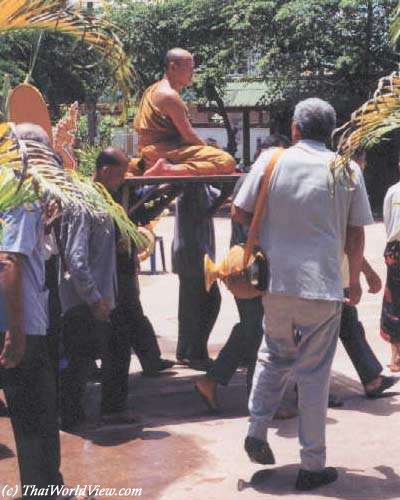 Some Buddhist ceremonies happen for special events. For example, if a monk decides to stay longer in a temple or has reached a new level of wisdom and knowledge, a ceremony might be organised to celebrate the event.
Some Buddhist ceremonies happen for special events. For example, if a monk decides to stay longer in a temple or has reached a new level of wisdom and knowledge, a ceremony might be organised to celebrate the event.Before and after the meal the abbot says a speech. All the monks staying in the monastey are present.
In the afternoon the abbot and the "celebrated" monk are lifted and carried three times around the temple. Faithful people sing and shout loudly. Everybody enjoy the feast
Then the ceremony finishs with a visit to the cemetery. The aim is that deceased persons also receive their part of merit.
Thursday, 15 May 2008
致四川地震不幸罹难的灾民
Wednesday, 14 May 2008
The Planets- Rahu & Ketu
 Rahu has smoke like blue body, lives in forests and is horrible. He is windy in temperament and is intelligent. Like Rahu is Ketu.
Rahu has smoke like blue body, lives in forests and is horrible. He is windy in temperament and is intelligent. Like Rahu is Ketu.Myth:
Lord Vishnu was dispensing amrita (divine nectar) amongst the gods. A demon, Rahu, was hiding himself and imbibing the drink without Lord Vishnu's knowledge. The Sun and the Moon discovered him and alerted Lord Vishnu. Vishnu threw his discus, cutting off the head of Rahu, but he had already swallowed the nectar and was now immortal. Therefore, there remained an immortal head called Rahu and an immortal body called Ketu.
Significations of Rahu:
Foreignness, strangeness, that which is unfamiliar. Rahu and Ketu form the army of the planetary cabinet. Ketu is the "flag" and Rahu is the marching troops. Therefore, Ketu represents that which is already conquered and Rahu represents that which is to be conquered. Other significations of Rahu are: Maternal grandmother, paternal grandfather, multicolored clothes, outcastes, lead, impulse, disillusionment, compulsions, obsessions, immaturity, insanity, fear from the unknown, worldly desires, separation, crime, drugs, extreme changes, upheavals.
Significations of Ketu:
Innate talents, intense scrutiny, dissatisfaction, doubt, fear from past experiences, mystical experiences, occult knowledge, asceticism, intrigues, enlightenment, worldly indifference, maternal grandfather, paternal grandmother. Ketu, as being the "flag", represents what we have already conquered and become very familiar with. The saying "familiarity breeds contempt" comes directly from Ketu as Ketu makes us contemptuous of all that is substantive.
Tuesday, 13 May 2008
Prayers
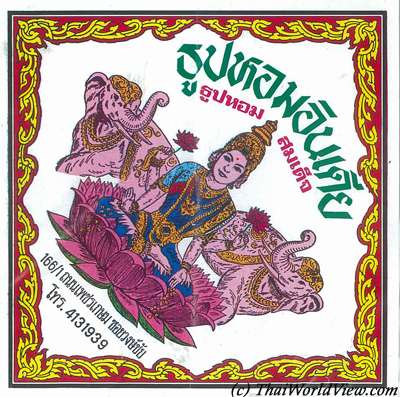 For Buddhists in Thailand, incense is an important element of worship to pay respect to Buddha.
For Buddhists in Thailand, incense is an important element of worship to pay respect to Buddha.When praying and requesting a favor to the Lord Buddha, Thai people take three incense sticks (ธููป), i.e one for the Buddha, one for the Sangha (สังฆ - Buddhist community), one for the Dharma (ธรรม - teachings of the Buddha), a flower (ดอกไม้ - orchid or lotus, which symbolizes the Buddhist teachings purity) and a small candle (เทียน - it symbolizes comprehension enlightenment). They lit the incense sticks and kneel three times and put the incense sticks in front of the statue.
Monday, 12 May 2008
Another Hindu Version - Rahu
 Rahu, the planet in shadows, is accorded recognition by the Indian astrologers and like Ketu, this planet is also not visible in the galaxy.
Rahu, the planet in shadows, is accorded recognition by the Indian astrologers and like Ketu, this planet is also not visible in the galaxy.Source material: A mine of information about Rahu is available in Brahmaavaivartha puraana, Mahaabhaagavatha, Mahaabhaaratha, Matsya puraana, Rigveda and Vishnu puraana.
Rahu was born to Simhika and Viprachitthi. Rahu’s mother simhika (also known as Simhita) was the daughter of Hiranyakashyapa (Bhakta Prahlada’s father). There are several brothers to Rahu and they are Salya, Nabha, Vaataapi, Ilvala and Namuchi. It is also believed that Rahu is the eldest of the 100 brothers. He also has a sister by name Maahishmathi.
OM BHRAAM BHREEM BHROUM SAHA RAHAVE NAMAHA
This mantra or the mantra in the Navagraha stotra pertaining to Rahu need to be chanted for 18000 times.
Sunday, 11 May 2008
Rahu Yantra
Rahu can be appeased through devoted worship and chanting of Rahu mantra to prevent hidden enemies, wrong diagnosis of illness, deceit from those around us and negative energies from affecting well-being.
Holy shower of Buddha - Vesak Day
 Bathing of Prince Siddhartha
Bathing of Prince SiddharthaMost temples hold ceremonial bathing of an image of baby Prince Siddhartha (the Buddha-to-be) placed in perfumed water with flowers. The perfumed water is scooped with a ladle and poured over the statue. This symbolises the purification of one’s unwholesome deeds with wholesome deeds.
• 1 st wash: May I eliminate all evil thoughts
多数寺院都会举行将悉达多太子的圣像置于充满鲜花及香水的盆里,用勺子掬起净水淋在佛像上,为佛沐浴的仪式。这象征以善行来净化我们的恶业。
The offering of fresh and beautiful flowers, which soon fade away serves as a reminder of the transience of all things, including our lives. This urges us to treasure every moment of our lives while not becoming attached to it.
供养美丽的鲜花,它们却在转瞬间枯萎凋零,提醒我们万物皆属无常。这会激励我们更珍惜生命中的每一刻而又不产生任何的执着。
Saturday, 10 May 2008
Vesak or Visakah Puja
The meaning of Vesak lies with the Buddha’s universal peace message to humankind. It has become a festival for rejoicing and goodwill to all – and a moment to reflect on our spiritual development and gratitude towards everyone. The name "Vesak" comes from the Indian month of that name in which it is held.
On Vesak day, some buddhists observe the Eight Precepts, while others may join the communal observances by going through the ceremony of taking the Threefold Refuge (in the Buddha, Dharma- the Buddha’s Teachings and Sangha-the community of monks and nuns), observing the Five Precepts of respect for life (not to kill); respect for personal property (not to steal); respect for personal relationships (not to indulge in the senses); respect for truth (not to lie); and respect for mental and physical well-being (not to take intoxicants); making offerings at shrines and chanting of sutras. They may also participate in processions and circumambulation, and listen to sermons of the Buddha’s Teachings.
Many Buddhists also take vegetarian meals on this day as they recall the teaching of universal Compassion. This is a day when temples are colourfully decorated with Buddhist flags and lights, and shrines filled with flowers, fruits and other offerings.
卫塞节, 农历四月十五的月圆之日, 是佛教团体每年最重要的一个节日。它纪念了佛陀出生、悟道及涅槃的三件大事。这天世界各地数以万计的佛教徒都会庆祝这个节日。卫塞的意义在于佛陀传达给全人类普遍性的和平讯息。这是一个让大家喜悦及互相祝福的美好节日,也是我们检讨自己在灵修上的进展与感恩大众的日子。
对于一些佛教徒而言,卫塞节的庆祝仪式始于早上到佛寺去受八关斋戒。有些信徒可能会集体接受三皈依 (皈依佛、法及僧)、受五戒 (尊重生命即断杀、护生;尊重个人的产业即不偷盗、乐于施舍;尊重人际的关系即不邪淫 、知足;尊重真相即不妄语、诚实; 尊重精神及身体的良好状态即不服用麻醉品)、供养三宝及诵念经文,他们也可能参加绕佛仪式并听闻佛法。
许多佛教徒也会在当天忆念广大的慈悲而持素戒杀。在卫塞节这一天,寺院挂上佛旗,张灯结彩,佛龛上摆放琳琅满目的鲜花、水果及其他供品。
愿天下母亲们快乐,安康!
 好久没有写东西了,最近非常地忙,忙工作,忙家里,忙着办好友母亲的丧事.
好久没有写东西了,最近非常地忙,忙工作,忙家里,忙着办好友母亲的丧事.